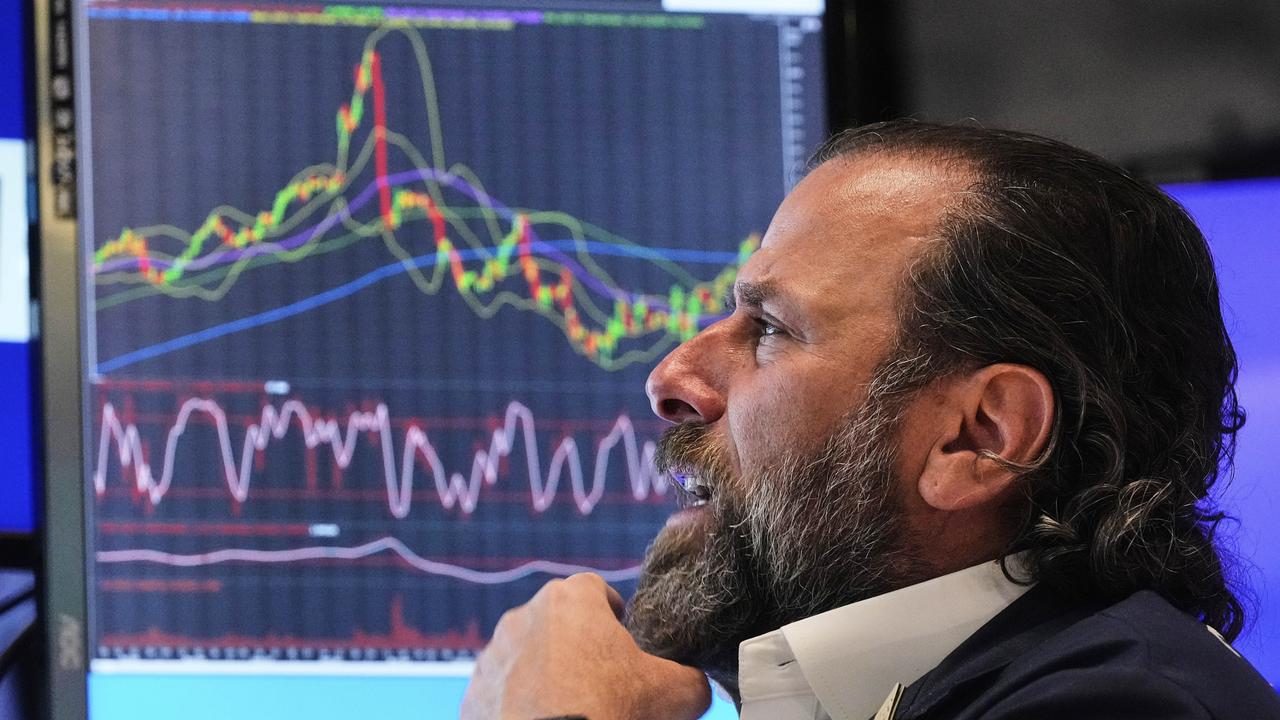ASX rises as Wall Street falls again, while US President Donald Trump insists America ‘will soon be open for business’
The Australian market has clawed back 4.2 per cent after suffering a near eight-year low. But consumer confidence has sagged as a flood of profit warnings pour in and the coronavirus spreads.
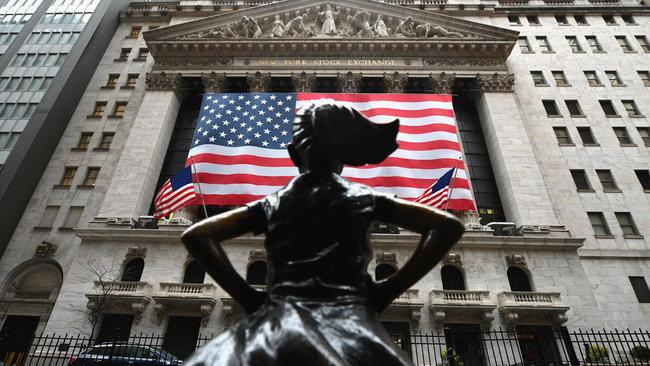
Business
Don't miss out on the headlines from Business. Followed categories will be added to My News.
Australia’s share market has risen more than four per cent from a near eight-year low as the US Federal Reserve unveiled unlimited quantative easing and new coronavirus cases seemed to plateau in Italy.
The benchmark S&P/ASX200 closed up 189.7 points, or 4.17 per cent, at 4,735.7, while the All Ordinaries index climbed 189.2 points, or 4.15 per cent, to 4,753.3.
The Australian dollar was buying 59.12 US cents, up 58.01 from at Monday’s close.
The market rebound comes despite consumer confidence drooping to its lowest level since the early 1990s recession.
The ANZ/Roy Morgan weekly consumer sentiment measure plunged 27.8 per cent during the week to its lowest in 30 years as consumers increasingly shun the shops.
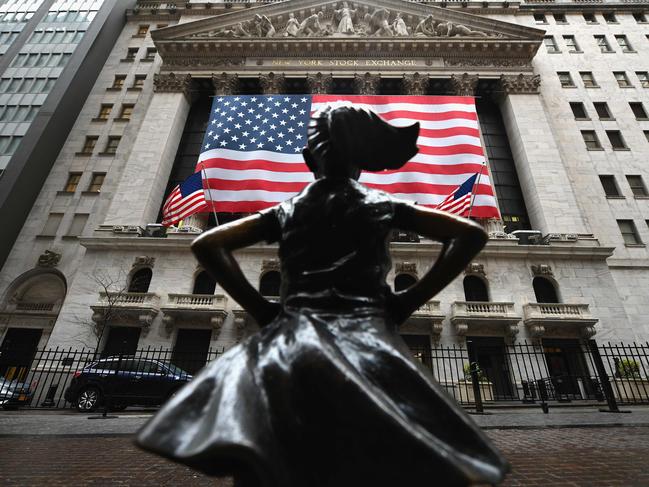
Confidence is 17 per cent below the depths reached during the global financial crisis.
The week started with a fresh wave of panic selling as investors were rattled by businesses and state and territory borders closing amid stricter measures to control the pandemic.
Gold miners were gainers on Tuesday after the price of gold rose again overnight.
Newcrest lifted $2.08, or 9.15 per cent, to $24.81 while Northern Star added $1.67, or 15.22 per cent, to $12.64..
The big banks all grew, ANZ lifting 51 cents to $14.61 as Commonwealth bank gained $2.32 to $56.58, NAB advanced 45 cents to $14.33 and Westpac added 46 cents to $14.56.
Woolworths was down $1.03 at $35.42 after it said venue closures, and changes to shopping behaviour at its supermarkets, meant it could not estimate the impact of the virus on its full year financial results.
Coles lost 14 cents to $15.44 as the supermarket rivals were given leave to work together to ensure supplies to everyone.
Seven West Media gained 0.5 cents to 7.1 cents after it said the postponing of the Olympics and AFL competition, along with a falling advertising market, means it must scrap its earnings guidance.
Michael Hill Jeweller dived 14.55 per cent to 23.5 cents after it postponed its interim dividend payment of 1.5 cents per share for six months. Retail Food Group fell 11.43 to 3.4 cents after the company, which runs Gloria Jeans cafes, Donut King, Crust pizza outlets and more, scrapped its guidance but noted good sales at some stores.
US markets were also lower even after the Federal Reserve’s second wave of rescue actions that included bond buying to ensure liquidity as the government failed to pass a stimulus deal.
That came as the World Health Organisation warned the global coronavirus infection rate was escalating.
TRUMP: ‘NOT A LONG-LASTING FINANCIAL PROBLEM’
Wall Street fell again as US Congress wrangled over a massive stimulus package while the Federal Reserve unveiled new emergency programs to boost the economy including with unlimited bond buying.
The scale of the Federal Reserve’s moves impressed investors, but stocks still fell in the first few minutes of trading as worries continue to rise about the economic pain being caused by the coronavirus outbreak.
Central banks are doing what they can to support the economy as more states and communities close down, but investors want to see the US government do its part as well.
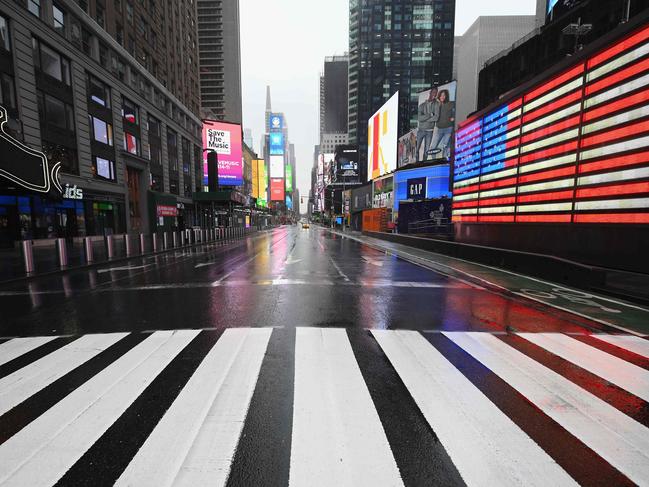
It came as President Donald Trump said he will not allow the coronavirus to do long-lasting damage to the US economy and that he would consider how to move forward after a 15-day shutdown ends next week.
“America will again and soon be open for business,” Trump told a news conference at the White House today. He added: “We are not going to let it turn into a long-lasting financial problem.”
Congress was debating a nearly US$2 trillion ($A3.5 trillion) rescue package for the economy over the weekend, but top White House officials and congressional leaders are struggling to finalise it.
Wall Street stocks were deep in the red shortly near midday on Monday (4am AEDT) as the economic toll from the coronavirus outbreak mounts and politicians wrangle over stimulus measures.
Near 1550 GMT, the Dow Jones Industrial Average was down 4.8 per cent, or around 925 points, at 18,246.36.
The broadbased S&P 500 sank 4.7 per cent to 2,195.89, while the tech-rich Nasdaq Composite Index tumbled 3.5 per cent to 6642.
In a series of sweeping steps, the Fed said it will set up three new lending facilities that will provide up to US$300 billion ($A516 billion) by purchasing corporate bonds, buying a wider range of municipal bonds, and purchasing asset-backed securities. It also says it will buy an unlimited amount of Treasury bonds and mortgage-backed securities in an effort hold down interest rates and ensure those markets function smoothly.
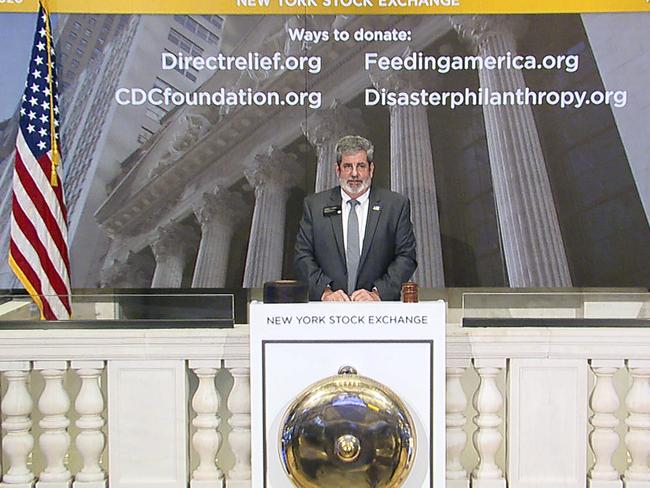
Last week saw US indices suffer their worst week since 2008 amid forecasts of a deep US and global economic contraction due to mass lay-offs as business activity shuts down due to the coronavirus.
US Treasury Secretary Steven Mnuchin said he would meet with leaders of both parties later Monday to advance a multi-trillion-dollar Senate proposal after the measure was halted in a procedural vote on Sunday night.
“My message is this needs to get done today,” Mr Mnuchin told CNBC in the US. Warning of severe economic disruptions due to the virus, the Fed announced it will buy unlimited amounts of US Treasury debt — essentially printing money for the economy — as well as new steps to lend directly to small- and medium-sized companies that have been among the hardest-hit as economic activity dries up.

Lockdowns and closures intended to halt the spread of the new coronavirus expanded over the weekend to include many cities around the world and the number of people infected surged past 336,000.
A sharp surge in cases and in deaths across the region, especially in Southeast Asia, have also raised the level of alarm.
Ultimately, investors say they need to see the number of new infections stop accelerating for the market to end its prolonged, bouncing tumble. Investors have continued to seek safety in US government bonds, driving their yields broadly lower. The 10-year Treasury yield, which influences interest rates on mortgages and other consumer loans, slid to 0.80 per cent Monday from 0.94 per cent late Friday.
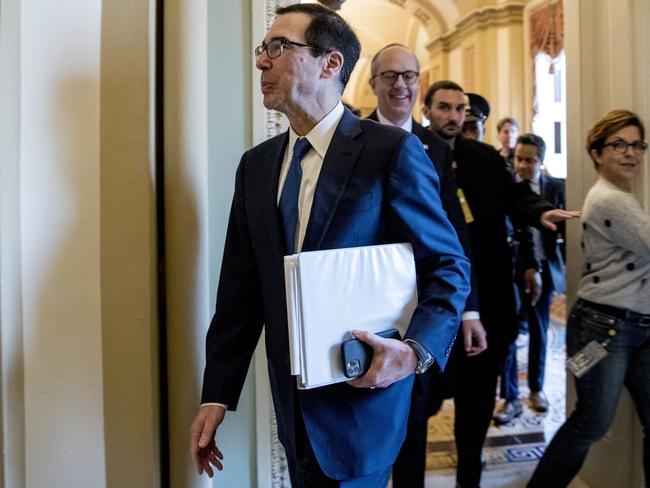
At nearly US$2 trillion ($A3.4 trillion), the US rescue package is the biggest effort yet to aid households and shore up the U.S. economy, the world’s biggest. But markets have continued to fall as scores of other governments and many central banks have acted as they try to stave off or at least alleviate the impact of a recession.
Many investors are waiting for markets to fall further before plunging back in, said Naeem Aslam of Avatrade.
Should the market drop by another 10 per cent to 20 per cent, the overall decline from recent peaks would be over 50 per cent, and “that would be a massive buy signal,” Mr Aslam said. More than 14,400 people have died of the coronavirus worldwide, while nearly 100,000 people have recovered.
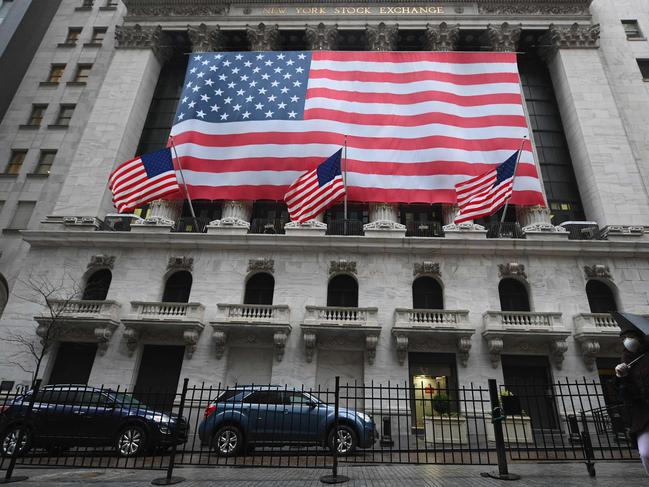
For most people, the coronavirus causes only mild or moderate symptoms, such as fever and cough, and those with mild illness recover in about two weeks. Severe illness including pneumonia can occur, especially in the elderly and people with existing health problems, and recovery could take six weeks in such cases.
The Fed said it also plans to soon announce a “Main Street Business Lending Program,” and pledged it “will continue to use it full range of tools to support the flow of credit to households and businesses.” Monday was the first session since the New York Stock Exchange suspended floor trading due to the coronavirus outbreak, pushing all transactions onto electronic platforms.
Originally published as ASX rises as Wall Street falls again, while US President Donald Trump insists America ‘will soon be open for business’

